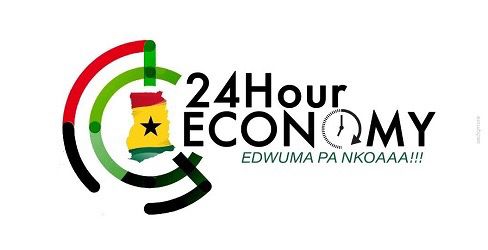Rethinking the 24-Hour Economy: It’s Not About Shifts, It’s About Systems
Public perception at the outset was simple: Ghana’s 24-Hour Economy would extend working hours and create more jobs. But the full policy blueprint reveals something far more ambitious, a cohesive structural transformation agenda that ties together agriculture, industry, supply chains, manufacturing, culture, and human capital. In other words, the policy isn’t about working around the clock. It’s about making the economy work better, deeper, and more sustainably. Jobs, in this framing, are not the starting point. They are the outcome of coherent growth in the productive sectors.
Agriculture has been made the cornerstone of industrial expansion. One of the strongest features of the policy is its understanding that you cannot industrialize what you cannot produce. Agriculture is positioned as the foundational block for Ghana’s industrial transformation, with explicit links to: reducing food imports, improving forex stability through domestic raw materials, feeding local industries like agro-processing, textiles, and pharmaceuticals, and creating supply chain linkages between rural farms and urban processing zones. This is a major improvement from past fragmented initiatives. It shows the government understands the centrality of agriculture to Ghana’s macroeconomic and industrial performance.
Here lies the real test: Are we building the value chains needed to feed this new economy, or are we just outlining bold targets without the groundwork?
Take the Strategic Manufacturing Value Chains (SMVs) outlined in the policy: Agro-processing, textiles and garments, pharmaceuticals, machinery and technology, and medicinal herbs and food supplements.
Under textiles and garments, the policy outlines plans to expand The Akosombo Textiles Limited (ATL) and Tex Styles Ghana enclave into full-scale spinning, dyeing, knitting, and printing powerhouses and phase out finished uniforms imports to stimulate domestic production of the garment and apparel ecosystem and position itself as a net exporter of African prints. But what’s missing is the cotton production. Ghana’s cotton production is currently declining and fragmented. Without rebuilding the cotton value chain; from farm to ginning, spinning, and weaving, these textile ambitions cannot be sustained. We’re setting up for dependence on imported yarn, which undercuts competitiveness. Compare this to Benin, which built a thriving cotton sector first, then developed the Glo-Djigbé Industrial Zone to convert that raw cotton into high-value textile exports. Their industrialization is anchored in raw material strength. Ours isn’t yet.
The Bigger Question: Do We Have What It Takes?
The 24-Hour Economy is right in framing economic transformation as a systems challenge. But do we have the right foundation to implement this vision? Do we have the land governance, irrigation, and agro-credit infrastructure to scale raw material production competitively? Can we align research, skills development, and financing to match the needs of each SMV? Without these pieces, the risk is that Ghana tries to industrialize on paper while continuing to import the raw materials it claims to replace. That’s not transformation, it’s repackaged dependency.
The 24-Hour Economy Policy reflects a deeper, more mature vision of economic transformation—one that tries to knit production, supply chains, industrial capacity, and human capital into a single loop. That’s a major step forward. But ambition alone won’t deliver results. The real litmus test is whether Ghana can build strong, local value chains to feed its industries, starting with agriculture, poultry, cotton, and other key manufacturing inputs. If we fail to do that, the entire model risks becoming uncompetitive. We’ll end up trying to industrialize using imported inputs, which defeats the purpose of the strategy. We cannot build the kind of resilient, forex-saving, job-creating economy this policy envisions while relying on external raw materials. Without deliberate, grounded investment in raw material competitiveness and supply chain depth, Ghana’s 24-hour economy will run 24 hours a day but on imported inputs and borrowed strength.
Credit- IMANI’s Criticality Analysis of Governance and Economic Issues. June 30 – July 4, 2025.

